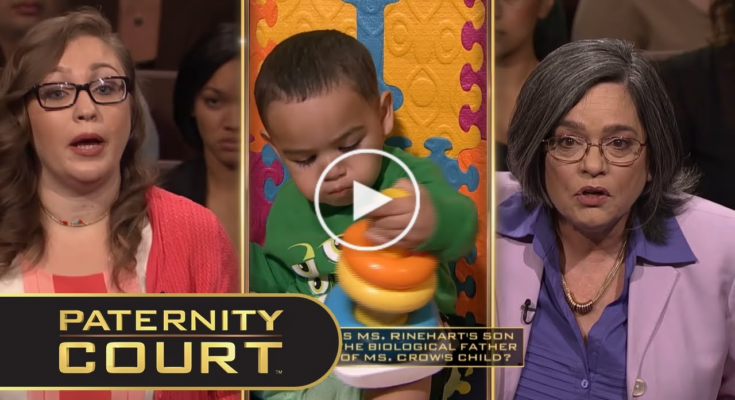The case of Crow v. Rinehart revolves around the paternity dispute of two-year-old Thomas. Ms. Crow seeks to establish that her deceased partner, JC Turner, is Thomas’s biological father. Ms. Rinehart, JC’s mother, denies the claim, questioning the validity of Thomas’s paternity. This article delves into the events leading up to the paternity dispute, the emotional impact on the involved parties, and the significance of DNA testing in reuniting families.
Ms. Crow’s determination to ascertain Thomas’s paternity is evident when she states, “My son deserves to know who his father is and to know his family” . Her quest for truth goes beyond monetary gains, as she adds, “It is more than just the money. I would like help with my son, yes, of course”. This pursuit highlights the emotional significance of paternity determination in providing a sense of identity and belonging for a child.
On the other hand, Ms. Rinehart expresses her doubts regarding Thomas’s paternity, stating, “For several reasons… there’s no way she could’ve been just two weeks pregnant and had a stomach as firm as she did”. Her belief that Thomas is not JC’s child leads to conflict between the two parties. Ms. Rinehart firmly denies any possibility of Thomas being her grandson, stating, “I don’t see my son in that… I don’t. I’m sorry, I don’t”.
Given the conflicting beliefs, the court relies on DNA analysis to determine Thomas’s paternity. Highlighting the importance of DNA testing, the judge says, “Because there wasn’t a blood card available to test the DNA of the deceased JC Turner, we performed a DNA test with the surviving parent, Maretta Rinehart”. This emphasizes the critical role of scientific evidence in resolving paternity disputes objectively.
The DNA test results bring emotional closure to the case as the judge reveals, “The percentage of relatedness between Ms. Rinehart and Thomas Crow is… 99.6 percent. You are related”. This scientific validation strengthens the bond between Ms. Rinehart and her grandchild. The long-awaited family reunion moment, where Ms. Rinehart meets Thomas for the first time, showcases the power of DNA testing in reuniting families.
Thomas’s emotional well-being remains paramount throughout the case. The court acknowledges the significance of father-son bonding when Ms. Crow reveals, “He [JC] was happy to have a child. He never denied my son” [03:36]. This highlights the emotional toll on a child who yearns to know his father and his family.
Ms. Crow’s inability to actively pursue Thomas’s paternity earlier in his life is understandable. She had to navigate the challenges of single motherhood, juggling the responsibilities of raising her two other children, and making ends meet without a job [10:05]. The absence of JC, coupled with the grief of losing him and her father, weighed heavily on her emotional well-being. As a result, her pursuit of truth was delayed, but her intentions were pure – to provide her son with the knowledge of his father’s identity.
Throughout the case, communication played a crucial role. Ms. Crow’s reluctance to attend JC’s memorial service, fearing a negative encounter with Ms. Rinehart, emphasizes the need for open and honest dialogue in resolving disputes. Misunderstandings and unresolved conflicts can hinder the progress towards a peaceful resolution. The court’s intervention in facilitating a private meeting between Ms. Crow and Ms. Rinehart with Thomas allowed them to connect and embrace their newfound relationship
The case of Crow v. Rinehart exemplifies the complexities and emotional challenges of paternity disputes. The pursuit of scientific truth through DNA testing plays a pivotal role in settling such disputes impartially. This case study emphasizes the significance of open communication, transparency, and honesty in maintaining healthy family relationships.
DNA testing’s power to validate family connections fosters emotional healing and reunites families torn apart by doubt and denial. As seen in the heartwarming reunion of Ms. Rinehart and Thomas, it is evident that the truth can bridge the gap between estranged family members and pave the way for a brighter and more united future. The case of Crow v. Rinehart serves as a poignant reminder of the importance of preserving the well-being and emotional security of children involved in paternity disputes through scientific evidence and family reunion.
The case of Crow v. Rinehart highlights the emotional and legal complexities involved in paternity disputes. DNA testing emerges as a powerful tool to establish family connections and provide closure to such conflicts. The pursuit of truth, open communication, and empathy are essential in fostering understanding and resolving family disputes. The emotional reunion of Ms. Rinehart and Thomas underscores the transformative power of DNA testing in reuniting families and strengthening their bonds. As society continues to evolve, DNA testing will continue to play a crucial role in providing clarity, healing, and a sense of belonging for individuals seeking answers about their family heritage.



